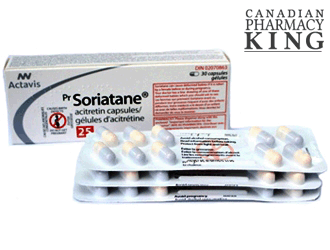
The medication Soriatane is used to treat severe forms of psoriasis, keratinization disorders and other skin conditions in adult. The medication Soriatane contains the active ingredient Acitretin. It is a retinoid and works by helping in a normal pattern of growth for skin cells. Take Soriatane exactly as prescribed by your doctor. For severe psoriasis, the starting dose is 25 mg once daily with maintenance daily dose from 25 mg to 50 mg and maximum daily dose is 75 mg. For other disorders of keratinization, the usual dose is 10 mg once daily, with maximum daily dose of 50 mg. Read your prescription guideline of Soriatane carefully and be sure to take it as prescribed by your doctor. Other skin care medication such as: Differin
Single-center retrospective study of long-term use of low-dose acitretin (Soriatane) for psoriasis - 2004, E Lee, J Koo, found that " Acitretin does not appear to cause significant long-term side effects at low doses; the implications for thousands of patients are that use of this medication can be continued for long periods of time with routine monitoring.”
Manufacturer Information
The brand Soriatane is manufactured by Teva in the UK (also known as Neotigason) and Australia. It is also manufactured by Aralez Pharma or Teva in Canada. The generic Acitretin Soriatane is also known as Novatretin manufactured by Douglas in New Zealand. It available in the dosage form of 10 mg and 25 mg as oral capsules.
Stop taking Soriatane and call your doctor at once if you have one of these serious side effects:
• Shortness of breath, dizziness, nausea, chest pain, weakness, trouble speaking (these can be signs of a heart attack or stroke)
• Swelling of legs, feet or ankles (signs of a blood clot)
• Worsening depression, suicidal thoughts, or thoughts of self-harm
• Decreased night vision
• Impaired hearing
• Aches or pain in joints of difficulty moving
• Rectal bleeding
• Changes in mood or depression and aggressive behaviour
Less serious side effects include nosebleeds, ear problems such as pain, wax in ear, eye problems such as blurred vision, conjunctivitis, tiredness, thirst, swelling of leg, foot, ankles, bleeding or inflammation of lungs, nausea, abdominal pain, skin infections, changes in appetite, back pain, bone or muscle pain, headache, trouble sleeping, skin problems like cold sweat, excessive sweating, sensitivity to sunlight. Please call your doctor if you have any further concerns or questions.
You should avoid consuming alcohol while taking this medication and until least 2 months after the treatment has stopped. You should also not donate blood while taking Soriatane and until at least 3 years after the treatment has stopped. Do not take Soriatane if you are allergic to acitretin or any other ingredients in this medication or any other retinoids, or Vitamin A or its metabolites, are pregnant or planning to become pregnant or breastfeeding, have severe liver or kidney disease, consistently high levels of lipid in the blood, take tetracyclines (an antibiotic used to treat infections), methotrexate (a drug used to treat arthritis) or have high vitamin A levels (hypervitaminosis A). You should always tell your health care professional about any medications that you have been taking or are going to take including prescription and non-prescription drugs, vitamins and herbal supplements. Drugs that can interact with Soriatane include Vitamin A, methotrexate, tetracyclines, phenytoin, glyburide, or a sulfonylurea (antidiabetic medications), St John’s Wort (herbal medication used to treat depression), alcohol, a low dose of progesterone-only contraceptive. While taking this medication, you should avoid prolonged exposure to sunlight or sunlamps. Use protective clothing or hat or sunscreen with SPF 30 or more. This medication can cause severely deformed babies if it is taken by a female before or during pregnancy and for at least 3 years after stopping. You must avoid becoming pregnant while you are taking Soriatane and until at least 3 years after you stop taking this medication (discuss this with your doctor). You must discuss effective birth control with your doctor before beginning treatment and you must use effective birth control without interruption. Contact your doctor immediately if you do become pregnant while taking Soriatane or after treatment has stopped. You should discuss the serious risk of having a baby with severe birth deformities because you are taking or have taken Soriatane, as well as available options, with your doctor. Do not breastfeed while taking Soriatane and until at least 3 years after the treatment has stopped.
• Where can I buy Soriatane online?
You can buy Soriatane online from https://www.CanadianPharmacyKing.com, or by phone, by fax, by mail or email.
• What are the steps to order Soriatane from a Canadian pharmacy?
Please view our How-to-Order page for the steps to order Soriatane from our Canadian pharmacy.
• Is a prescription required to purchase Soriatane from a Canadian pharmacy?
Yes, a prescription is required to purchase Soriatane from Canadian Pharmacy King.
• Are there any discounts or coupons available for Soriatane?
Unfortunately, there are no discounts or coupons available for Soriatane. However, Canadian Pharmacy King is proud to offer exceptional high-quality prescription medications at an affordable price.
• How long does it typically take for Soriatane to arrive when ordered from Canada?
It may take 4-8 business days for Soriatane to be delivered from Canada to the USA. If you have any questions about shipping frame, please contact our customer support at 1-877-745-9217 for details.